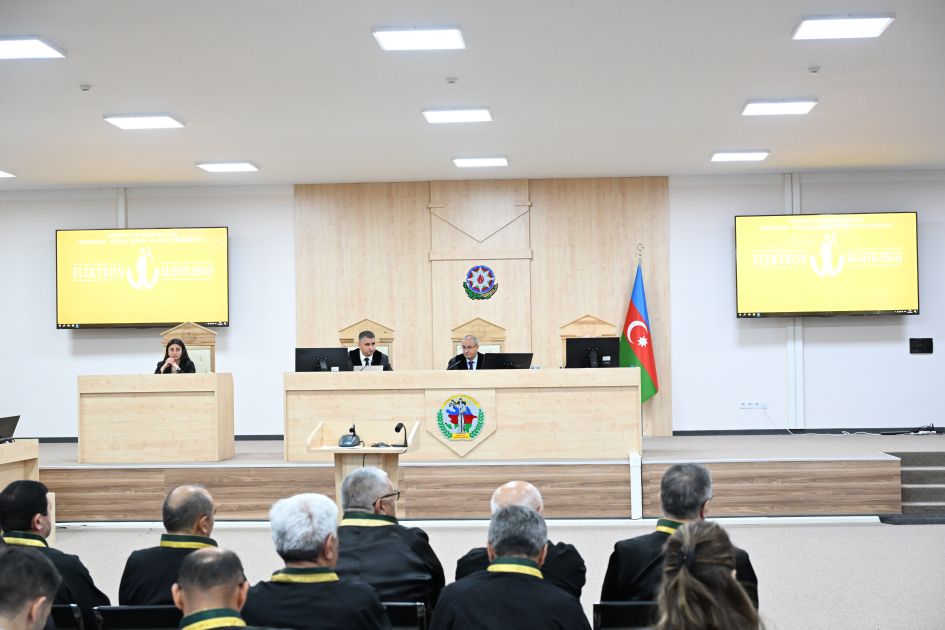New evidence of illegal settlements in Azerbaijan’s formerly occupied territories revealed in court

The open court hearing concerning criminal charges against several Armenian officials accused of war crimes and other grave offenses related to Armenia’s military aggression against Azerbaijan continued on June 21 at the Baku Military Court, Azernews reports.
The trial involves defendants including Arayik Harutyunyan, Arkadi Gukasyan, Bako Sahakyan, Davit Ishkhanyan, David Babayan, Levon Mnatsakanyan, among others. The defendants face accusations of crimes against peace and humanity, including planning and conducting an aggressive war, genocide, violations of the laws of war, terrorism and its financing, as well as forcibly seizing and retaining power.
Presided over by Judge Zeynal Agayev and a panel including judges Jamal Ramazanov and Anar Rzayev (with reserve judge Gunel Samadova), the court ensured each accused was provided with translation services in their native language and legal representation.
The session was attended by the accused individuals, their defense lawyers, victims, legal heirs, representatives, and prosecuting attorneys.
During the proceedings, Bako Sahakyan, former leader of the so-called regime established by Armenia in Azerbaijan’s formerly occupied territories between 2007 and 2020, responded to questions regarding his membership in the “Hayastan” Pan-Armenian Fund, an organization founded in 1992 by decree of then-President Levon Ter-Petrosyan. Sahakyan confirmed that many Armenian officials and de facto leaders of the occupied region were fund members, which collected donations from Armenians worldwide and Armenian businessmen.
Funds collected were reportedly used for various projects both in Armenia and in the occupied territories, including infrastructure, healthcare, and education. Sahakyan revealed that with the fund’s resources, two major highways connecting Armenia to the Garabagh region were constructed, facilitating the transfer of military equipment into Azerbaijani territories.
The court also examined evidence proving systematic illegal settlement in Azerbaijan’s occupied regions by foreign nationals, primarily from Syria and Lebanon, as well as others. Official documents from Azerbaijan’s Ministry of Defense, Foreign Intelligence Service, and State Security Service were reviewed, demonstrating the demographic manipulation of areas including Lachin, Kalbajar, Zangilan, and Gubadli districts.
Video evidence presented featured testimonies from settlers, such as a man named Toni Hacar from Beirut, who described arriving in the occupied territories via Armenia and receiving housing and employment opportunities. Another video showed a so-called local government official explaining how housing was allocated to settlers, with temporary residence expected to convert to private ownership after ten years.
A 2001 plan for illegal resettlement was also introduced, outlining a ten-year program to build 10,000 housing units, 200 schools, and other public infrastructure projects. The “Tufengyan” fund was identified as a major investor in these initiatives, contributing approximately four million USD.
Sahakyan admitted the projects aimed to increase the population after a sharp decline caused by the First Garabagh War but acknowledged limited success, with many settlers unwilling to remain due to inadequate infrastructure and services.
He further confirmed that illegal settlers were granted various incentives, including tax exemptions and other compensations.
Additionally, Sahakyan confirmed deforestation activities in the occupied territories, which were authorized only with the approval of designated officials and involved cutting trees for barrel production used in wineries. Some timber was used locally, while some was exported to Armenia.
The trial is scheduled to continue on June 23.
The defendants are charged under numerous articles of the Criminal Code of the Republic of Azerbaijan, including but not limited to: planning and conducting an aggressive war, genocide, war crimes, crimes against humanity, terrorism and its financing, illegal arms trafficking, attempted assassination of public figures, forcible seizure and retention of power, and creation of illegal armed groups.
This trial represents a significant step in holding accountable those responsible for Armenia’s prolonged aggression and violations of international law in Azerbaijani territories.
Here we are to serve you with news right now. It does not cost much, but worth your attention.
Choose to support open, independent, quality journalism and subscribe on a monthly basis.
By subscribing to our online newspaper, you can have full digital access to all news, analysis, and much more.
You can also follow AzerNEWS on Twitter @AzerNewsAz or Facebook @AzerNewsNewspaper
Thank you!
